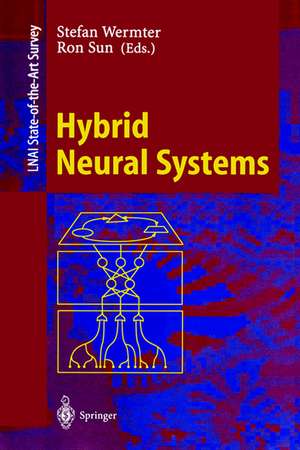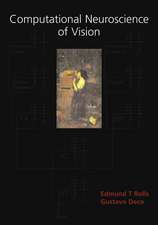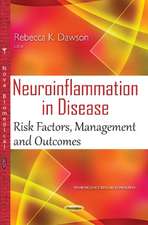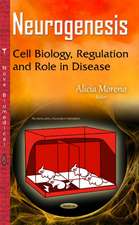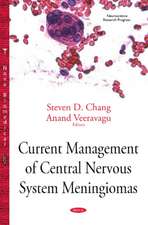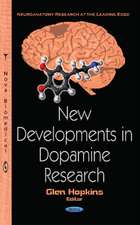Hybrid Neural Systems: Lecture Notes in Computer Science, cartea 1778
Editat de Stefan Wermter, Ron Sunen Limba Engleză Paperback – 29 mar 2000
The 26 revised full papers presented together with an introductory overview by the volume editors have been through a twofold process of careful reviewing and revision. The papers are organized in the following topical sections: structured connectionism and rule representation; distributed neural architectures and language processing; transformation and explanation; robotics, vision, and cognitive approaches.
Din seria Lecture Notes in Computer Science
- 20%
 Preț: 1061.55 lei
Preț: 1061.55 lei - 20%
 Preț: 307.71 lei
Preț: 307.71 lei - 20%
 Preț: 438.69 lei
Preț: 438.69 lei - 20%
 Preț: 645.28 lei
Preț: 645.28 lei -
 Preț: 410.88 lei
Preț: 410.88 lei - 15%
 Preț: 580.46 lei
Preț: 580.46 lei - 17%
 Preț: 427.22 lei
Preț: 427.22 lei - 20%
 Preț: 596.46 lei
Preț: 596.46 lei -
 Preț: 449.57 lei
Preț: 449.57 lei - 20%
 Preț: 353.50 lei
Preț: 353.50 lei - 20%
 Preț: 1414.79 lei
Preț: 1414.79 lei - 20%
 Preț: 309.90 lei
Preț: 309.90 lei - 20%
 Preț: 583.40 lei
Preț: 583.40 lei - 20%
 Preț: 1075.26 lei
Preț: 1075.26 lei - 20%
 Preț: 310.26 lei
Preț: 310.26 lei - 20%
 Preț: 655.02 lei
Preț: 655.02 lei - 20%
 Preț: 580.93 lei
Preț: 580.93 lei - 20%
 Preț: 340.32 lei
Preț: 340.32 lei -
 Preț: 381.21 lei
Preț: 381.21 lei - 20%
 Preț: 591.51 lei
Preț: 591.51 lei - 15%
 Preț: 438.59 lei
Preț: 438.59 lei - 20%
 Preț: 337.00 lei
Preț: 337.00 lei -
 Preț: 389.48 lei
Preț: 389.48 lei - 20%
 Preț: 607.39 lei
Preț: 607.39 lei - 20%
 Preț: 1024.44 lei
Preț: 1024.44 lei - 20%
 Preț: 579.30 lei
Preț: 579.30 lei - 20%
 Preț: 763.23 lei
Preț: 763.23 lei - 20%
 Preț: 453.32 lei
Preț: 453.32 lei - 20%
 Preț: 575.48 lei
Preț: 575.48 lei - 20%
 Preț: 585.88 lei
Preț: 585.88 lei - 20%
 Preț: 825.93 lei
Preț: 825.93 lei - 20%
 Preț: 763.23 lei
Preț: 763.23 lei - 17%
 Preț: 360.19 lei
Preț: 360.19 lei - 20%
 Preț: 1183.14 lei
Preț: 1183.14 lei - 20%
 Preț: 340.32 lei
Preț: 340.32 lei - 20%
 Preț: 504.57 lei
Preț: 504.57 lei - 20%
 Preț: 369.12 lei
Preț: 369.12 lei - 20%
 Preț: 583.40 lei
Preț: 583.40 lei - 20%
 Preț: 343.62 lei
Preț: 343.62 lei - 20%
 Preț: 350.21 lei
Preț: 350.21 lei - 20%
 Preț: 764.89 lei
Preț: 764.89 lei - 20%
 Preț: 583.40 lei
Preț: 583.40 lei - 20%
 Preț: 649.49 lei
Preț: 649.49 lei - 20%
 Preț: 341.95 lei
Preț: 341.95 lei - 20%
 Preț: 238.01 lei
Preț: 238.01 lei - 20%
 Preț: 538.29 lei
Preț: 538.29 lei
Preț: 646.43 lei
Preț vechi: 760.50 lei
-15% Nou
Puncte Express: 970
Preț estimativ în valută:
123.70€ • 129.47$ • 102.95£
123.70€ • 129.47$ • 102.95£
Carte tipărită la comandă
Livrare economică 31 martie-14 aprilie
Preluare comenzi: 021 569.72.76
Specificații
ISBN-13: 9783540673057
ISBN-10: 3540673059
Pagini: 420
Ilustrații: IX, 408 p.
Dimensiuni: 155 x 235 x 22 mm
Greutate: 0.59 kg
Ediția:2000
Editura: Springer Berlin, Heidelberg
Colecția Springer
Seriile Lecture Notes in Computer Science, Lecture Notes in Artificial Intelligence
Locul publicării:Berlin, Heidelberg, Germany
ISBN-10: 3540673059
Pagini: 420
Ilustrații: IX, 408 p.
Dimensiuni: 155 x 235 x 22 mm
Greutate: 0.59 kg
Ediția:2000
Editura: Springer Berlin, Heidelberg
Colecția Springer
Seriile Lecture Notes in Computer Science, Lecture Notes in Artificial Intelligence
Locul publicării:Berlin, Heidelberg, Germany
Public țintă
ResearchCuprins
An Overview of Hybrid Neural Systems.- An Overview of Hybrid Neural Systems.- Structured Connectionism and Rule Representation.- Layered Hybrid Connectionist Models for Cognitive Science.- Types and Quantifiers in SHRUTI – A Connectionist Model of Rapid Reasoning and Relational Processing.- A Recursive Neural Network for Reflexive Reasoning.- A Novel Modular Neural Architecture for Rule-Based and Similarity-Based Reasoning.- Addressing Knowledge-Representation Issues in Connectionist Symbolic Rule Encoding for General Inference.- Towards a Hybrid Model of First-Order Theory Refinement.- Distributed Neural Architectures and Language Processing.- Dynamical Recurrent Networks for Sequential Data Processing.- Fuzzy Knowledge and Recurrent Neural Networks: A Dynamical Systems Perspective.- Combining Maps and Distributed Representations for Shift-Reduce Parsing.- Towards Hybrid Neural Learning Internet Agents.- A Connectionist Simulation of the Empirical Acquisition of Grammatical Relations.- Large Patterns Make Great Symbols: An Example of Learning from Example.- Context Vectors: A Step Toward a “Grand Unified Representation”.- Integration of Graphical Rules with Adaptive Learning of Structured Information.- Transformation and Explanation.- Lessons from Past, Current Issues, and Future Research Directions in Extracting the Knowledge Embedded in Artificial Neural Networks.- Symbolic Rule Extraction from the DIMLP Neural Network.- Understanding State Space Organization in Recurrent Neural Networks with Iterative Function Systems Dynamics.- Direct Explanations and Knowledge Extraction from a Multilayer Perceptron Network that Performs Low Back Pain Classification.- High Order Eigentensors as Symbolic Rules in Competitive Learning.- Holistic Symbol Processing and theSequential RAAM: An Evaluation.- Robotics, Vision and Cognitive Approaches.- Life, Mind, and Robots.- Supplementing Neural Reinforcement Learning with Symbolic Methods.- Self-Organizing Maps in Symbol Processing.- Evolution of Symbolisation: Signposts to a Bridge between Connectionist and Symbolic Systems.- A Cellular Neural Associative Array for Symbolic Vision.- Application of Neurosymbolic Integration for Environment Modelling in Mobile Robots.
Caracteristici
Includes supplementary material: sn.pub/extras
